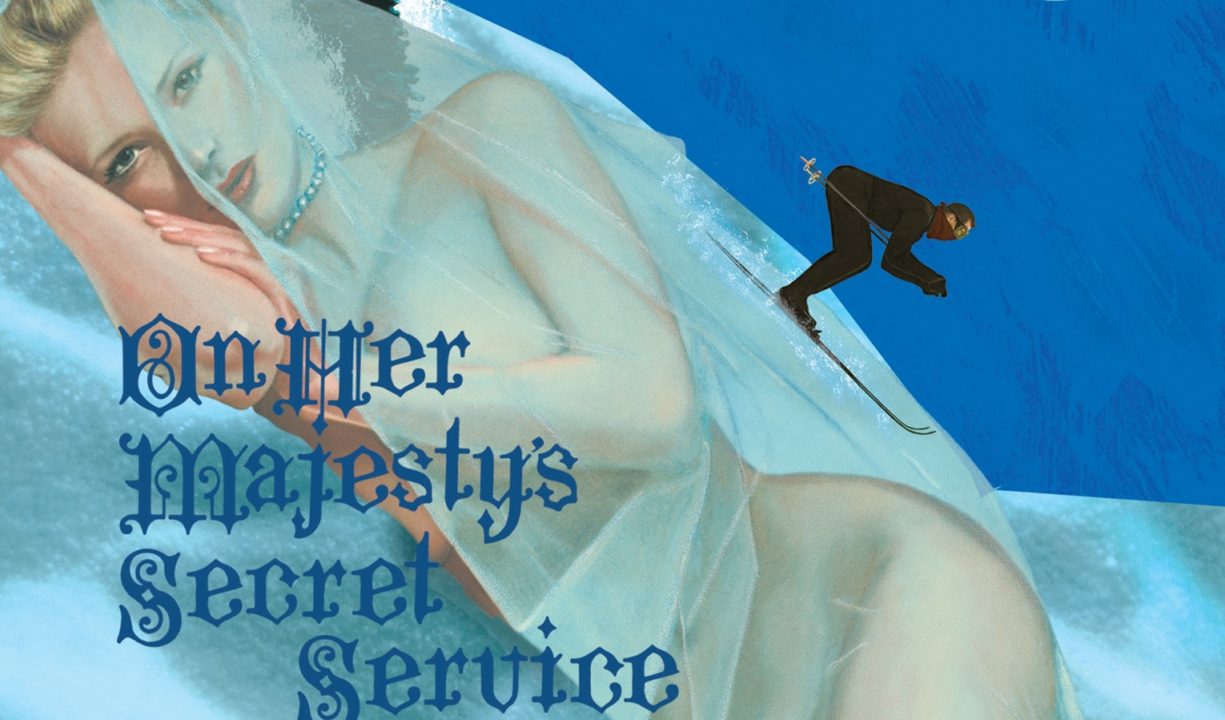The opening chapter of On Her Majesty’s Secret Service is called “Seascape with Figures”, and it’s hard to think of a more perfect title. Within, Fleming paints a picture with words, befitting its name, and without a doubt this is the best written of his works. The writing is evocative and thrilling, somehow finding poetry among the truly insane amount of exclamation marks found throughout. James Bond has been on the hunt for Blofeld and SPECTRE for months but has found no indication that they are still active, which directly contradicts The Spy Who Loved Me. It’s fascinating that Fleming is already refusing to acknowledge his last book – a failure in his eyes – as canon. On the day he drafts his resignation from the Secret Service, Bond saves a young woman from suicide on a French beach, only to be to be captured by a pair of henchmen. The scene is a stunning tableau: the sunset, the beautiful girl, the concerned hero, and the men in dark coats following across the sands. It’s a scene of tragedy, romance, and intrigue; the perfect way to open the novel.
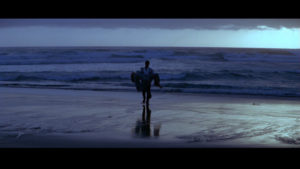 On Her Majesty’s Secret Service feels like a potential ending for the story of James Bond, partly because of Fleming returning to where it all began. Bond returns to the Casino Royale and the first thing he does is smell the familiar stench, a callback to the first novel’s opening. There is, of course, yet another incomprehensible card game that goes on for far too long before the troubled Tracy appears. We learn that Bond makes an annual pilgrimage to Royale to visit Vesper’s grave and the novel does a good job of linking Bond’s new love with his first. Watching the films in the demented order they were produced, the comparisons between Vesper and Tracy are lost, but in the novel everything about Tracy is a response to Vesper. James Bond couldn’t save Vesper from suicide but sees a chance to correct this failure and pain by saving Tracy.
On Her Majesty’s Secret Service feels like a potential ending for the story of James Bond, partly because of Fleming returning to where it all began. Bond returns to the Casino Royale and the first thing he does is smell the familiar stench, a callback to the first novel’s opening. There is, of course, yet another incomprehensible card game that goes on for far too long before the troubled Tracy appears. We learn that Bond makes an annual pilgrimage to Royale to visit Vesper’s grave and the novel does a good job of linking Bond’s new love with his first. Watching the films in the demented order they were produced, the comparisons between Vesper and Tracy are lost, but in the novel everything about Tracy is a response to Vesper. James Bond couldn’t save Vesper from suicide but sees a chance to correct this failure and pain by saving Tracy.
Bond is immediately enraptured by Tracy yet deeply concerned. She drives dangerously, gambles with no money, and is interested in Bond only for pleasure. “Treat me like the lowest whore in creation,” she says, planning to kill herself the next day. After Bond saves her, he is taken to her father, Draco, the head of a large criminal organisation. I was concerned when Draco appeared because Fleming’s gangsters from previous novels have been nothing but appalling clichés, but thankfully he’s more Risico than he is Diamonds Are Forever. I also love that Bond’s turn-and-crouch with the throwing knife when entering Draco’s office, one of my favourite moves from the films, comes directly from the book. Draco’s a fun character and it’s fascinating seeing Bond become allies with a man he may otherwise be sent to eliminate. He offers backstory on Tracy. After the death of her baby, she “burned her heart living too greedily” but Draco believes Bond is the key to saving her. Draco offers Bond a million-pound dowry to marry Tracy, which he says he’ll think on.
 On Her Majesty’s Secret Service is a very well-thought-out book. That’s not to say the others weren’t but… okay, they weren’t. Fleming has clearly thought about each aspect of the novel and many story beats, however minor, play into the key themes. It’s certainly the richest novel in the series. Bond’s secretary Loelia has gotten married and has been replaced by Mary Goodnight, further pushing Bond towards thinking about settling down himself. On the trail of Blofeld, thanks to information given by Draco, Bond visits a genealogist and discusses his family tree and the idea of legacy and family weighs heavily on Bond. Although the time frame of the series remains ambiguous, the character of Bond feels subtly older in this novel, perhaps ready to settle down.
On Her Majesty’s Secret Service is a very well-thought-out book. That’s not to say the others weren’t but… okay, they weren’t. Fleming has clearly thought about each aspect of the novel and many story beats, however minor, play into the key themes. It’s certainly the richest novel in the series. Bond’s secretary Loelia has gotten married and has been replaced by Mary Goodnight, further pushing Bond towards thinking about settling down himself. On the trail of Blofeld, thanks to information given by Draco, Bond visits a genealogist and discusses his family tree and the idea of legacy and family weighs heavily on Bond. Although the time frame of the series remains ambiguous, the character of Bond feels subtly older in this novel, perhaps ready to settle down.
All these aspects are thematically connected yet Bond’s search for Blofeld disappointingly takes him away from Tracy for too long. They apparently see each other and develop a relationship but this happens offscreen – or offpage, rather. We need to experience the time they spend together to buy into the relationship, not just briefly hear about it in recollections once the novel jumps forward in time. I now see the stunning love montage in the film as a vital addition.
Blofeld wants a new identity and won’t settle for anything less than being a count. Like so many supervillains, admin is his downfall. Bond discovers his application, for lack of a better word, and poses as Hilary Bray, a genealogist sent to confirm the validity of Blofeld’s claim, to visit his base at Piz Gloria high in the Alps. Up to this point, undercover Bond has been my least favourite Bond. Despite acting no different to his usual persona, Bond was miserable throughout Diamonds Are Forever while undercover and it was contemptible to read. Thankfully, this is much better. Bond is actually acting as Hilary, becoming a campy klutz, which is very enjoyable to read. Yet the danger is still there. There’s a good balance between fun and tense, with the possibility of Bond being found out never evaporating. He’s in the viper’s nest and even struggles with the altitude making him physically weak. It’s an improvement over this section of the film, which I’ve always found rather boring.
While on the summit of Piz Gloria, Fleming’s descriptions of the location feel less like the indulgent travelogues of books past and more like necessary reconnoitres to prepare us for the action to come once everything, metaphorically and literally, explodes. The freezing, dangerous environment is just as much a mood setting as it is a location. Skiing is such a classic staple of Bond, a necessity even, something I’m annoyed Daniel Craig’s incarnation never did onscreen, so it was great to finally read Fleming’s Bond in a snowy environment.
 On the mountain, watched over by the evil Irma Bunt, a woman who Fleming feels the constant need to remind the reader is very, very ugly every few pages, are ten beautiful women who are undergoing treatments for allergies. I don’t know if Fleming was especially ignorant or just society at large at this time, but I think he means phobias rather than allergies. There’s a woman who is terrified of chickens, for instance. Bond sleeps with one of the women to find out more and doesn’t even think of his new life with Tracy. Even if he still decided to do so for his mission, it would have been interesting characterisation for Bond to think about betraying his new love, but the opening section with Tracy might as well not have happened. They feel like two separate novels, the romance with Tracy and the mission for Blofeld, until both come crashing together in the book’s final third.
On the mountain, watched over by the evil Irma Bunt, a woman who Fleming feels the constant need to remind the reader is very, very ugly every few pages, are ten beautiful women who are undergoing treatments for allergies. I don’t know if Fleming was especially ignorant or just society at large at this time, but I think he means phobias rather than allergies. There’s a woman who is terrified of chickens, for instance. Bond sleeps with one of the women to find out more and doesn’t even think of his new life with Tracy. Even if he still decided to do so for his mission, it would have been interesting characterisation for Bond to think about betraying his new love, but the opening section with Tracy might as well not have happened. They feel like two separate novels, the romance with Tracy and the mission for Blofeld, until both come crashing together in the book’s final third.
“He knew what not to expect, the original Blofeld, last year’s model”. This is perhaps the greatest disappointment to be found in On Her Majesty’s Secret Service. Thunderball set up a truly threatening villain in Blofeld, the anti-Bond, and I was so excited to see Bond go up against him in this novel. Now, he’s just a guy. I understand the internal logic reasons for the change – that Blofeld has to alter his appearance and manner to hide – but the new version of the character is just lame and uninteresting. There’s nothing unique or threatening about him. Blofeld has even started working with the Russians, downgrading him from the ultimate antagonist to just another baddie backed by the Soviets, like so many in the books. Bond, as Hilary, and Blofeld’s meeting is interrupted by Shaun Campbell, a colleague of Bond’s found spying on the mountain, in a great ‘oh shit’ moment. Bond knows his cover is about to be blown. Once the initial shock wears off however, the twist feels somewhat unsatisfying. Bond didn’t make a mistake nor did Blofeld deduce anything, it falls apart because of a random third party.
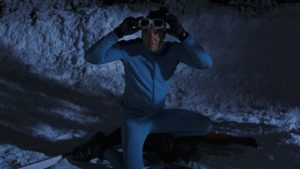 After playing the gentile and rather camp Sir Hillary for so long, it was great to see Bond back as a brutal killer when he realises that he needs to escape in the dead of night. His shroud falls and he murders someone with his watch, not with an inventive and rather silly gadget like those seen in the films but rather by using the item as a makeshift knuckle duster to the neck. The action is perhaps the most thrilling and violent Fleming has ever written, a direct contrast with the romance and quiet detective work of the rest of the book. The ski chase and Bond out-skiing an avalanche is good pulpy fun but the near miss with the train concluding the sequence is brilliant. Fleming has his failings when it comes to writing but these moments are where he shines; it’s riveting. Although, Fleming’s constant weapon metaphors do grow tiring, especially when I’m not sure if the sound in the woods actually is machine-gun fire or just sounds like machine-gun fire, because everything does in Fleming’s world apparently.
After playing the gentile and rather camp Sir Hillary for so long, it was great to see Bond back as a brutal killer when he realises that he needs to escape in the dead of night. His shroud falls and he murders someone with his watch, not with an inventive and rather silly gadget like those seen in the films but rather by using the item as a makeshift knuckle duster to the neck. The action is perhaps the most thrilling and violent Fleming has ever written, a direct contrast with the romance and quiet detective work of the rest of the book. The ski chase and Bond out-skiing an avalanche is good pulpy fun but the near miss with the train concluding the sequence is brilliant. Fleming has his failings when it comes to writing but these moments are where he shines; it’s riveting. Although, Fleming’s constant weapon metaphors do grow tiring, especially when I’m not sure if the sound in the woods actually is machine-gun fire or just sounds like machine-gun fire, because everything does in Fleming’s world apparently.
No superhero, Bond is exhausted after his escape from Piz Gloria and can barely walk, stumbling through a Christmas market and seeking refuge in an ice rink. That’s when Tracy, like an angel, finally reappears in the story, whisking Bond away to safety, transcending the role of the usual Bond girl. But the trouble is that, because the relationship between Bond and Tracy was skipped over, when she reappears, she feels like a completely different person. The last we saw her was the night she tried to commit suicide and now she’s full of life – vibrant, capable, and confident – stemming from her love for Bond that developed completely offpage. I like her use in the story, now knowing that Bond is an agent after being sent to find him by her father, but is this really the same women from the start of the book? Her and Bond together also offer one of the book’s most hilarious moments, that I can’t decide whether is the right level of silliness or goes too far, when they point a big red arrow on the side of the road in the opposite direction to make a car following them drive off a cliff, like a Wile E. Coyote cartoon.
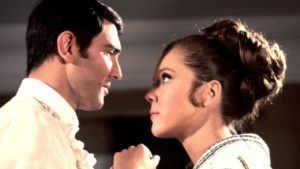 Bond finally proposes to Tracy the next day in a grotty airport diner, which is charming in its sense of normality but I do like the scene from the film better. That goes for most of the film actually. On Her Majesty’s Secret Service is one of Fleming’s finest novels but the film just so happens to be one of the best in the series too. It’s a pretty perfect adaptation, tightening the plot and balancing all the elements better, much like the adaptation of Goldfinger. Tracy is perhaps the greatest improvement onscreen. The book makes her seem bipolar, losing her initial characterisation when she falls in love. Once Bond proposes she becomes totally subservient, saccharine, and gentle. Diana Rigg managed to do a phenomenal job keeping a consistency to the character despite her radical changes in mindset from beginning to end. She maintains that fire and zest during the emotional moments and the emotion during her fiery moments. Fleming however seems incapable of this and writes her as two separate personalities.
Bond finally proposes to Tracy the next day in a grotty airport diner, which is charming in its sense of normality but I do like the scene from the film better. That goes for most of the film actually. On Her Majesty’s Secret Service is one of Fleming’s finest novels but the film just so happens to be one of the best in the series too. It’s a pretty perfect adaptation, tightening the plot and balancing all the elements better, much like the adaptation of Goldfinger. Tracy is perhaps the greatest improvement onscreen. The book makes her seem bipolar, losing her initial characterisation when she falls in love. Once Bond proposes she becomes totally subservient, saccharine, and gentle. Diana Rigg managed to do a phenomenal job keeping a consistency to the character despite her radical changes in mindset from beginning to end. She maintains that fire and zest during the emotional moments and the emotion during her fiery moments. Fleming however seems incapable of this and writes her as two separate personalities.
“She’s got everything I’ve looked for in a woman. She’s beautiful, in bed and out. She’s adventurous, brave, and resourceful. She’s exciting always. She seems to love me. She’d let me go on with my life. Above all, she needs me. It’ll be someone for me to look after.” In the early Bond novels, it felt like we were learning more about Bond with each adventure and then the characterisation slowed dramatically. James Bond became a steadfast character the whole world could describe in a few simple words. Thankfully, On Her Majesty’s Secret Service sees Fleming begin to further develop the character again, delving into what he looks for in a wife and also his fear in settling down. While Fleming states “all this nest-building gave him a curious pleasure,” Bond also has a brilliant nightmare of having to go to dinner parties and *shock horror* engage in small talk. What makes Tracy work so well as a potential partner is that she represents part of Bond. She’s his spirit, or soul. They were both depressed at the same time, her suicidally and him planning to resign, and the two rise into true happiness together.
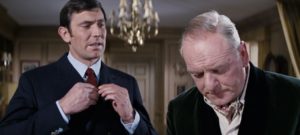 Back in England to debrief, Bond visits M at his home on Christmas Day, where the old man spends his time painting watercolours. M debates his own retirement and how much money he’ll need before he can step away, which ties directly to Bond’s circumstances of the wedding and dowry. Notably there is no Mrs M but he does have some married friends over for dinner. I like that one of the remits of the novel seems to be to delve into the private lives of all the characters in Bond’s world, to flesh them out as people, and for M that constitutes a rant about Christmas crackers.
Back in England to debrief, Bond visits M at his home on Christmas Day, where the old man spends his time painting watercolours. M debates his own retirement and how much money he’ll need before he can step away, which ties directly to Bond’s circumstances of the wedding and dowry. Notably there is no Mrs M but he does have some married friends over for dinner. I like that one of the remits of the novel seems to be to delve into the private lives of all the characters in Bond’s world, to flesh them out as people, and for M that constitutes a rant about Christmas crackers.
Bond and M discuss Blofeld. After reading this chapter, I can now see why writers decide to have their villains launch into long expository monologues that detail their plans to Bond in the films. It may be a cliché but it’s better than what we get in the book: a man from the Ministry of Agriculture explaining in excessive detail what biological warfare is and what Blofeld’s plan likely constitutes. Guessing each part of it but, of course, being absolutely correct despite the lack of information. The ten beautiful women have been hypnotised and will poison specific farms to bring the British economy to its knees.
M makes the bold move of giving Bond permission to use Draco and his men to assault Piz Gloria, destroying the base and killing Blofeld, because proper channels are too slow and require political manoeuvring. This is an interesting development and I would have liked to see it further explored but this is an Ian Fleming action finale so it has to be incredibly rushed despite the long build-up. Up to this point in the series Bond hasn’t returned to a villain’s base before and it’s fascinating to read how much he fears that damnable place on the mountain. Yet he spends very little time there because, as soon as he lands, Draco blows it up and Bond runs after Blofeld who is escaping down the bobsleigh track. It’s a good sequence but plays like a less interesting version of the ski chase we got just 100 pages previous. Blofeld and Bunt get away but their plan goes up in flames.
 James Bond is being watched. Throughout the final few chapters, as Bond has an impromptu bachelor party with an ex-Luftwaffe taxi driver and plans his wedding, the reader is privy to the fact that Bond is being followed. I’m not sure I like that, unlike the film, the book doesn’t commit to the happy ending, making the shocking ending not all that shocking. Blofeld’s revenge instead feels inevitable. Bond and Tracy marry in a consulate after a small service, which I know is more realistic but the film is, again, so much better. I miss M and Draco interacting and that throw of the hat to Moneypenny. But this is Bond the civil servant of the books, not the superspy of the films. After driving off as husband and wife, Bond stops the car at a Shell petrol station next to the autobahn. It’s not the stunning location of the film but the ending is heartbreaking nonetheless. Blofeld drives past and fires the gun himself rather than having it be Bunt – finally something the book does better – and Bond is left cradling Tracy’s body, stating they have all the time in the world.
James Bond is being watched. Throughout the final few chapters, as Bond has an impromptu bachelor party with an ex-Luftwaffe taxi driver and plans his wedding, the reader is privy to the fact that Bond is being followed. I’m not sure I like that, unlike the film, the book doesn’t commit to the happy ending, making the shocking ending not all that shocking. Blofeld’s revenge instead feels inevitable. Bond and Tracy marry in a consulate after a small service, which I know is more realistic but the film is, again, so much better. I miss M and Draco interacting and that throw of the hat to Moneypenny. But this is Bond the civil servant of the books, not the superspy of the films. After driving off as husband and wife, Bond stops the car at a Shell petrol station next to the autobahn. It’s not the stunning location of the film but the ending is heartbreaking nonetheless. Blofeld drives past and fires the gun himself rather than having it be Bunt – finally something the book does better – and Bond is left cradling Tracy’s body, stating they have all the time in the world.
It’s an emotional ending, yanking away that sense of closure that the entire novel was revelling in. Bond saved Tracy’s life at the start of the book only to drag her into a life that leads to her death at the end. I can’t wait to read You Only Live Twice, an actual sequel to this shocking event that the films never had. Tracy may not have been the most well-realised female character in her own right on the page, Blofeld was a huge disappointment I’m still frustrated by, and even the pacing faltered in some places, but On Her Majesty’s Secret Service is the best written of the James Bond novels thus far, both in terms of its poetic descriptions of locations and snappy engaging action. It’s a thematically rich novel and, after the oddity that was The Spy Who Loved Me, Fleming feels re-energised, like he has an actual story he needs to tell, deepening Bond as a character in the process. It may not be the very best but On Her Majesty’s Secret Service is easily in the top three novels in the series alongside Moonraker and From Russia with Love.
Stay tuned to OutofLives for my thoughts on the penultimate of Fleming’s Bond novels, You Only Live Twice, in the coming weeks.




